IR35: Everything Contractors & Businesses Need to Know
- 7 Dec 2022
- 8 mins read
- Posted in
Updated on the 21st of April 2023
Content:
Do you need to worry about IR35?
What does "Outside IR35" mean?
How does IR35 apply to limited companies?
What businesses need to keep in mind as they engage contractors
After much debate and discussion (and a few delays), the IR35 is finally in place!
If you are working with freelancers or independent contractors, it's likely that you’re already familiar with the term IR35. You may have heard it referred to as the ‘intermediaries legislation’ or the ‘off-payroll working rules’. However, you may still not be very clear on what it stands for, who gets impacted by it, and what your responsibilities might be. And you’re not alone.
That, after all, is exactly the reason behind all the debates and discussions – the rules and reach of IR35 were not always very clearly defined, thus leaving it open to interpretations and misunderstandings.
This blog will delve into the scope of IR35, and outline the basics of all that you need to know to remain compliant.
What is IR35?
IR35 is a legislation in the UK, issued by HM Revenue and Customs, that aims to determine whether independent contractors are taking undue advantage of the tax laws to pay a significantly lower amount than they rightly should.
Employees in the UK are required to pay a certain amount as taxes on their salary, and make contributions to National Insurance (NIC). But this amount is considerably lower for independent contractors (especially if they are working through a limited company), since any dividends they earn are not subject to NIC, and they can claim business costs.
However, in many instances, it was found that workers and their client companies were taking advantage of this law. The workers were functioning as employees, and enjoying all the benefits that an employee would – but they were legally operating as an independent contractor and paying themselves largely through dividends so as to avoid paying higher amounts as taxes.
The IR35 was introduced to identify and penalize these instances of misconduct and tax fraud.
Know the rules
Get yourself acquainted or re-acquainted with the legislation to make sure you either a) stay outside of IR35 or b) know you’re within the IR35 rules so that your income is taxed correctly.
What constitutes employment or self-employment is a bit of a grey area. But three factors, in particular, stand out: mutuality of obligation, control and substitution. At the most basic level – is your ‘client’ obliged to provide you with work and for you to accept it? Do they supervise you or decide how, where and when you carry out the work? Are you allowed to provide a substitute in your place? Accountancy firm Crunch provides more detail on these principles.
Of course, there’s more to it than this. The Government has issued guidance on employment status along with the Check Your Employment Status for Tax (CEST) tool although the latter has been met with scrutiny from some quarters for accuracy and bias.
Do your freelancers and contractors fall inside or outside IR35?
Taking this short quiz will highlight some of the factors you need to consider.
What are the changes in IR35?
This legislature is actually not new – it was first introduced back in 2000. Back then, the rules stated that each individual contractor was responsible for determining whether IR35 would apply to them, and how much they’d have to pay as taxes.
This saw a change in 2017, in the public sector. As per the new rules, this responsibility shifted from the contractors themselves – and now it was up to their clients in the public sector to determine which worker would fall within the scope of IR35. Based on this, they would then need to deduct the correct amount as taxes.
In 2021, the same change was implemented in the private sector as well. This means if you are engaging independent contractors, you might need to know how to classify them, and whether or not to make any deductions to their payments. But this doesn’t apply to all client businesses, or for all independent contractors. So let’s look at who would be impacted by IR35.
Do you need to worry about the IR35?
As a client, the first thing you need to do is answer these questions:
a) Is your turnover more than £10.2 million?
b) Do you have a balance sheet total of more than £5.1 million?
c) Do you have over 50 employees?
If you answered ‘No’ to at least two of these questions, you would be legally defined as a small business. This means you do not need to worry about determining the IR35 status of those you work with.
However, if you answered ‘Yes’ to two or more of these, you would be categorized as a mid- or large-sized business. You’d then have to bear the responsibility of determining your workers’ IR35 status. Now let’s see who within your workforce might be impacted by this law.
None of your permanent employees will be affected by IR35 – irrespective of whether they are working with you full-time, part-time or on a remote basis. You can continue paying them their salary, and making the required deductions as you usually do. Similarly, any contractor whom you’ve hired through an umbrella company will also not be affected here, since the umbrella company would already have them on contract and be paying them through PAYE.
But any other freelancer or independent contractor you work with might potentially fall within the scope of this law, especially if they are working through an intermediary (like a limited company, a partnership, or a personal service firm). This is when you will have to establish whether these workers are ‘inside’ or ‘outside’ IR35.
What does "Inside IR35" mean?
When an independent contractor is seen to be fulfilling the same roles and responsibilities that an employee would, and are enjoying the same benefits, they are said to fall inside IR35. This means they would also have the same tax status as an employee – so they may need to pay a higher amount as taxes and NIC payments.
As the business that is engaging them, you would be obligated to start deducting the required tax amounts from the payments you make to them, and also start making the necessary National Insurance contributions as their employer.
Don’t forget – if these workers come under investigation by the HMRC and are found to have been wrongly operating outside the IR35 all along, they may face fines and penalties. The HMRC might also decide to investigate their contracts going back up to 6 years.
What does "Outside IR35" mean?
When a worker is seen to be rightfully operating as an independent contractor, bearing the risks and uncertainties of contract work, and forgoing the benefits that employees enjoy, they are said to fall outside the scope of IR35.
This means they would not be impacted by this law, and they can continue working as an independent contractor and running their own limited company legitimately as they have been doing. They will be responsible for paying their own taxes, and they can continue enjoying the tax breaks that an independent contractor is entitled to.
As the company engaging them, you will remain their client, and not be considered as their employer instead. You will have no additional responsibilities towards them, and will not need to make any tax deductions or NIC payments on their behalf.
How does IR35 apply to limited companies?
If your independent contractors are working through a limited company, it is both their responsibility and yours, to follow certain best practices to ensure that their contract remains outside IR35, and doesn’t fall within the scope of this law.
The way to do this is to understand what it means to be self employed as per HMRC rules, have those boundaries clearly defined in the contract, and actually live up to those guidelines in the way you function.
Essentially, you will need to ensure that your contractors are not operating as disguised employees. Unlike employees, the independent contractors should be able to work as they see fit, without you controlling when, where and how they work. Your contract with them should be service-based, rather than ongoing, time-based employee contracts.
The contractors should also be willing to embrace the risks of owning their own limited company. For example, they should make their own financial investments to purchase equipment, licenses, insurance or anything else they need to run their company. They should assume the responsibility of looking for new work and growing their business, without requiring any guarantees from you about providing future work.
IR35 Checklist
Here’s a handy checklist that will help you determine whether your independent contractors will fall within the scope of IR35. Although this is by no means exhaustive, this provides some good pointers to begin identifying who would fall inside IR35 and who would not.
|
Operational details |
Inside IR35 |
Outside IR35 |
|
Personal responsibility |
The independent contractor has to personally fulfill the obligations under the contract. |
The independent contractor does not have to perform the tasks personally. They are allowed to bring in a substitute or delegate tasks to others in their limited company. |
|
Degree of control |
The contractor does not get to control when, where and how they work. The client company dictates their work timings and conditions, and often asks them to work from company offices or other specified locations. |
The contractor is fully in control of when, where and how they work. |
|
Independence in working |
The contractor’s work is closely monitored and supervised by the client company. |
The contractor works independently, and the client only has a say in the final results delivered. |
|
Employment benefits |
The contractor enjoys benefits like sick leave, paid time off, maternity benefits, and other perks like access to the company gym, health plan, child care services etc. |
The contractor does not enjoy sick leave, time off, maternity benefits or any other advantages that employees are entitled to. |
|
Mutuality of obligation |
The client is obligated to continue providing work to the contractor, and the contractor is obligated to take it up. |
The work is performed on a contractual basis. Once a project is over, the client may or may not decide to continue working with the contractor on new projects. The contractor has the right to accept or turn down any new work as they choose. |
|
Financial risk |
The contractor bears no financial risk in working with the client. The client bears all the expenses of providing the equipment, acquiring licenses, offering training and getting any work redone or corrected. |
The contractor is responsible for paying for their own equipment, licenses, training etc. If any work is rejected by the client, the contractor is required to correct it at their own expense. |
|
Exclusivity |
The client disallows the contractor from taking up any other work while their contract is ongoing. |
The contractor is not required to work exclusively with one client and can take up any other work as they choose. |
|
Business identity |
The contractor’s company has no business identity, brand assets, business insurance or anything else that a legitimate business would have. |
The contractor’s limited company has its own business identity, like a brand name, a company website, business insurance, their own office space etc. |
What businesses need to keep in mind as they engage contractors
Now that we have gone over the basics of what is IR35, and the broad details of what puts a contractor inside or outside the scope of the law, let’s discuss what you (as a UK-based medium or large business) need to keep in mind as you work with contractors.
-
Determine IR35 status of all your independent contractors: You will need to review the contracts of everyone in your workforce and use a Status Determination Statement (SDS) to ensure that they are correctly classified.
-
Communicate the results of your assessment: You will be required to officially notify each independent contractor about their deemed employment status, as determined by your SDS assessment. You must clearly outline the reasons for arriving at the conclusion you did, and ensure that they have a way to reach out to you if they do not agree with your results.
-
Avoid blanket determinations: Although reviewing every contract may be effort intensive, you must ensure not to put all your contractors within the scope of IR35 by default. This has serious consequences for legitimate contractors as they lose out a huge chunk of their income unnecessarily. So such a blanket approach construes an unfair employment practice for you as a business.
-
Make deductions as required: That said, if some of your contractors do fall within the scope of IR35, you are obligated to make the necessary tax and NIC deductions. You will also have to start making employer NIC contributions on their behalf.
-
Maintain relevant SDS records and other protocols: Put the right processes in place and maintain all records as you go along. This will help you protect your company, and prove that you have followed the right protocols, should any disputes or disagreements arise later.
-
Always work with the right contracts: Ensure that the roles and responsibilities of the independent contractor, as well as your obligations as the client, are clearly stated in the contract. You can also work with your legal team to have specific IR35 clauses put in place to protect yourself, should the contractor be found guilty of tax-related misconduct in future.
How TalentDesk can help
With the rules getting updated and new nuances of IR35 coming to light, you may not always be able to stay ahead of the changes. That’s where TalentDesk’s Agent of Record (AOR) services come in handy.
An Agent of Record helps you ensure that you do not misclassify employees as contractors and vice versa. Though the ultimate decision of a contractor’s status is determined through the HMRC’s tests of employment, it helps to have clear guidelines at a company level, to help you establish who would fall inside the scope of IR35 and who would be exempt from it. This is the crucial first step in ensuring that you remain IR35 compliant, as a client.
We also help you put the right contracts in place as you engage contractors. This has always been important to ensure that your freelancer and contractor engagement remains smooth and hassle-free. Now, it is also critical in helping you protect yourself as a client under the IR35 regulations.
Finally, when you find a good contractor, you may wish to work with them on new projects and requirements as they come up. We enable you to remain compliant through your engagement via regular check-ins and by offering you ongoing guidelines and best practices as you work with contractors.

Sanhita Mukherjee
Speak to us to find out how we can help you avoid hire contractors efficiently
Related articles
What is a Contingent Worker?
What is a Contingent Worker?
Learn what a contingent worker is and why they’re key to a flexible workforce. Explore the types, benefits, and management strategies for contingent talent
What is a Vendor Management System (VMS)? A Complete Guide
What is a Vendor Management System (VMS)? A Complete Guide
Discover what a Vendor Management System (VMS) is and why it’s essential for managing your workforce. Streamline vendor management with ease.
Best Contractor Management Software for 2025
Best Contractor Management Software for 2025
Discover the best contractor management software to streamline workflows, ensure compliance, and simplify payments. Manage global contractors with ease.

What is a Contractor Of Record (COR)?
Discover the role of a Contractor of Record (COR) – Learn how a COR streamlines contractor compliance and safeguards your business legally.
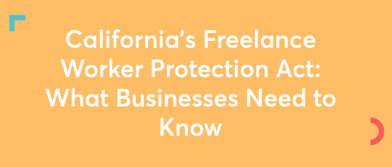
California’s Freelance Worker Protection Act: What Businesses Need to Know
Learn how California’s Freelance Worker Protection Act (FWPA) impacts your business with compliance requirements, payment rules, and penalties.

Mastering Influencer Management: Strategies for Effective Collaboration
Our guide to influencer management, exploring strategies, tools, and tips to create successful influencer relationships and enhance your marketing impact.
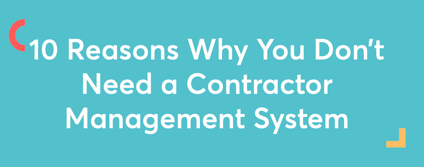
10 Reasons Why You Don’t Need a Contractor Management System
Discover 10 hilarious reasons why you absolutely don’t need a contractor management system - because who needs efficiency, happy freelancers, or sleep?
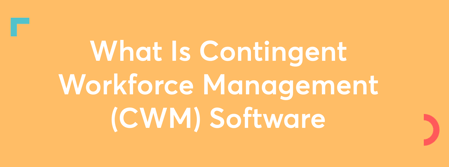
What Is Contingent Workforce Management Software?
Discover how contingent workforce management software enhances cost savings & access to talent. Learn about essential tools, compliance & best practices.
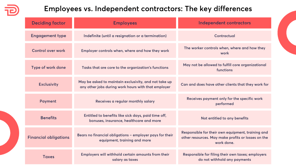
The Hidden Complexities of Independent Contractor Classification
Read the complexities of independent contractor classification in our guide. Stay ahead with expert insights into evolving rules, tools, and future trends.
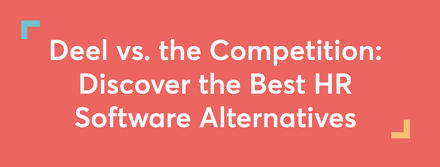
Deel vs. the Competition: Discover the Best HR Software Alternatives
Discover the best Deel alternatives for global HR management. Compare features, pricing, and reviews to find the best solution for your global workforce.
